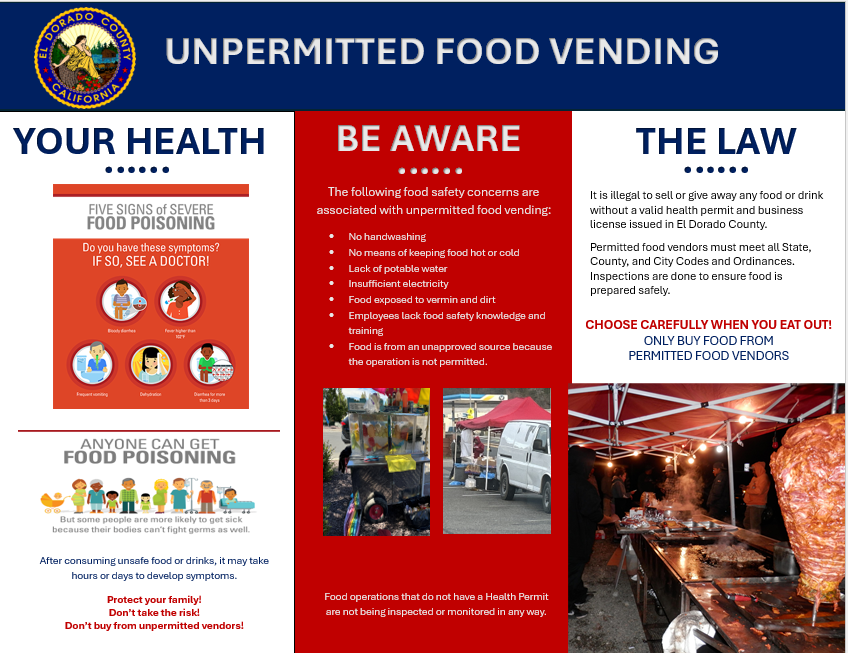Prevent unpermitted food vending in El Dorado County
The El Dorado County Environmental Management Department, Environmental Health Division, works to safeguard public health and ensure food provided to consumers is safe, unadulterated, and honestly presented by regulating the food sold or distributed to the public.
Who are the unpermitted food vendors?
Unpermitted food vendors are people who are selling/peddling food on a cart, truck, trailers, table, from the trunk of cars, or from their home without a health permit to operate from Environmental Management, nor have a valid business license.
Vendors who sell/peddle ONLY prepackaged non-potentially hazardous foods and whole, uncut produce at a display less than 25 square feet are exempt from obtaining a permit to operate from Environmental Management.
What are some health concerns associated with unpermitted food vendor sales?
- Poor personal hygiene
- No handwashing on site
- Don’t know where the food was purchased
- Food is not kept hot and left out all day
- Food may be prepared in a dirty home kitchen, in the garage, in a backyard, or outside
- Food stored or prepared on the floor and on unclean surfaces
- No food safety training to people who handle the food
- Food is undercooked
- No refrigerators to keep food cold
- Unsafe cooking equipment
- No restrooms
- Sick employees preparing food
- Chopping food using dirty knives or a cutting board
- Insects, mice, or rats in the home
Where do unpermitted food vendors sell?
- From the trunk of a car or the back of a truck
- Roaming door to door in the neighborhood
- On street corners and parking lots with a table and cooking equipment set up
- From unpermitted homes; dining room, garage, or backyard (i.e. underground dining)
- Outside stadiums after a sporting event, concert, or show
How do I know if these food sales are permitted with Environmental Management?
It is required by law that permitted food facilities, including mobile roadside vendors, display their health permit in a visible location for the public to see. If the permit expires, it is no longer valid until the owner obtains a new one. Permits from another county are valid within that county but not in our county unless issued by Environmental Management. If you do not see a health permit, ask the vendor to show and display it. If they do not have one, they are most likely unpermitted in the county.
Who should I notify if I suspect someone is selling food without a valid health permit (home, cart, truck)?
If you know of a vendor or suspect a vendor who is selling their food without a permit, contact Environmental Management at (530) 621-5300 or send us an email at emd.info@edcgov.us.
Please provide us with the following information:
- Day and time the food is being sold.
- The location, including cross streets, if no address available
- The type of food sold and how (on a cart, truck, trailer, street corner, from the trunk of a car, under a tent, at a home)
Protect your family
The Centers for Disease Control (CDC) estimates that each year, roughly 1 in 6 Americans (or 48 million people) get sick, 128,000 are hospitalized, and 3,000 die of foodborne diseases. Keep you and your family safe by being Smart and Eating Safe!
Environmental Management protects the public by inspecting facilities to ensure the food is being safely prepared at your favorite restaurant, grocery, truck, and cart. Our goal is to prevent the public from becoming ill with a foodborne illness (sometimes called "foodborne disease," "foodborne infection," or "food poisoning”). Avoid eating from unpermitted food vendors and report them to Environmental Management.
